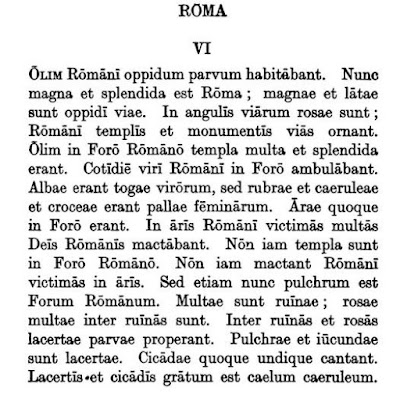[i] adjectives
croceus, -a, -um: yellow
iūcundus, -a, -um: pleasant
lātus, -a, -um: wide
Rōmānus, -a, -um: Roman
ruber, rubra, rubrum: red
splendidus, -a, -um:
splendid
[ii] other vocabulary
āra, -ae [1/f]: altar
cantō, cantāre [1]: sing
cīcāda, -ae [1/f]: grasshopper
lācerta, -ae [1/f]: lizard
mactō, mactāre [1]:
sacrifice
victima, -ae [1/f]: a beast
for sacrifice; the term “sacrificial victim” which is how some dictionaries
describe this word could lead us into thinking that the text is referring to human
sacrifice whereas the reference pertains to blood offerings in terms of
animals.
An interesting link to read
is:
https://www.perseus.tufts.edu/hopper/text?doc=Perseus:text:1999.04.0062:id=sacrificium-harpers
It goes into detail about
sacrificial rituals, and I just quote one small part of it:
"Human sacrifices as a
means of expiation were not unknown to the earliest Greek and Roman worship,
and continued in certain cases (e. g. at the feast of the Lycaean Zeus and of
Iupiter Latiaris) until the imperial period. Where, however, they continued to
exist, criminals who were in any case doomed to death were selected, and in
many places opportunity was further given them for escape. As a rule, these
human sacrifices gave way to symbolical exercises in which the rite either
merely suggested the original form, or else for human victims effigies or
puppets were substituted."
[A]
1. How is Rome described?
2. How are the streets of
Rome described?
3. There was only one temple
in the Roman Forum, wasn’t there?
4. Describe the colour(s) of
[i] the togas and [ii] the shawls
5. What adjective is used to
describe the Roman Forum?
6. All the Roman ruins have
gone, haven’t they?
7. There are ugly, unhappy
lizards running around, aren’t there?
[B] Match the Latin with the
English:
cotīdiē; etiam nunc; nōn
iam; nunc; ōlim; quoque; undique
also; at one time (in the
past); even now; every day; everywhere; no longer; now
[C] Find the Latin:
[1]
- Roman men [nominative; subject of the sentence] │ used to walk in the Forum.
[2]
- The Romans at one time used to inhabit │ a small town [accusative; direct object]
- The Romans used to sacrifice │ many victims [accusative; direct object]
- There are many roses │ among the ruins [accusative; with preposition]
[3]
- the streets │ of the town [genitive; possession]
- the togas │ of the men [genitive; possession]
- the shawls │ of the women [genitive; possession]
- on the corners │ of the streets [genitive; possession]
[4]
- On the altars the Romans used to sacrifice many victims │ to the Roman gods [dative; indirect object]
[5]
- in the Roman Forum [ablative; with preposition]
- on the altars [ablative; with preposition]
- on the corners [ablative; with preposition]
- The Romans decorate / adorn the streets │ with (by means of) temples and monuments [ablative of means i.e. what was used to perform the action]

No comments:
Post a Comment